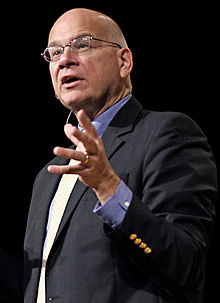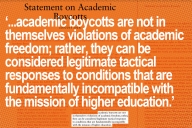You have /5 articles left.
Sign up for a free account or log in.
 Princeton Theological Seminary announced Wednesday that it is dropping plans to give an award to the Reverend Timothy Keller that was to have been presented when he visited the campus to give a lecture. The invitation to give the lecture, however, stands, and the seminary announced that Keller has agreed to give the talk even without the honor.
Princeton Theological Seminary announced Wednesday that it is dropping plans to give an award to the Reverend Timothy Keller that was to have been presented when he visited the campus to give a lecture. The invitation to give the lecture, however, stands, and the seminary announced that Keller has agreed to give the talk even without the honor.
Word that Keller was to speak at and be honored by the seminary angered many students and alumni, who noted that it is affiliated with the Presbyterian Church (USA), which embraces the ordination of women and of gay people (both groups are educated on an equal basis with others at the seminary). Keller is a leader of the Presbyterian Church in America, which will not ordain people who are not straight men, and he has been an advocate for that position.
The seminary is not affiliated with Princeton University.
As students and alumni objected to the invitation, the seminary initially said that, under the principles of academic freedom, the invitation and award would not be withdrawn. But on Wednesday the seminary announced that the honor would be withdrawn.
The honor is closely linked to the lecture. As described on the seminary website: "The Abraham Kuyper Prize for Excellence in Reformed Theology and Public Life is awarded each year to a scholar or community leader whose outstanding contribution to their chosen sphere reflects the ideas and values characteristic of the neo-Calvinist vision of religious engagement in matters of social, political and cultural significance in one or more of the ‘spheres’ of society. A condition of the prize is that the recipient deliver a lecture on a topic appropriate to the aims of the center."
To many in the world of Presbyterian theology, the honor matters a great deal, and past lectures have been widely discussed.
Traci Smith, a pastor who was educated at the seminary, wrote a widely circulated blog post questioning the idea that her alma mater would honor a theologian committed to the idea that she and many others should never have been ordained.
"I’ll let others argue finer points of Reverend Keller’s theology (hello, this is Princeton Theological Seminary here, arguing finer points is what we do). My personal soapbox is much less refined. It boils down to this: an institution designed to train men and women for ministry shouldn’t be awarding fancy prizes to someone who believes half the student body (or is it more than half?) has no business leading churches. It’s offensive and, as I have taught my four- and five-year-olds to express, it hurts my feelings," Smith wrote.
She added, "But he’s not even talking about 'women’s issues' or 'LGBT issues,' some will argue. The lecture is on church planting. Who can argue with church planting? Can’t we look past what divides us find common ground? Of course we can find common ground. Let me state clearly and without equivocation: I believe Reverend Keller loves Jesus. I believe he is a man of faith. I believe he works hard and has a respectable career. I would happily go to the church he pastors and listen to him preach. He’s absolutely invited to come to the church I pastor and listen to me preach. We can totally hold hands during the hymn sing. The reason that’s not enough in this case (and the reason he shouldn’t have been invited to give this lecture and receive this prize) is that this isn’t some minor thing. This is a giant lecture with a giant whoop-de-doo factor."
An assistant to Keller, who is the founding pastor of Redeemer Presbyterian Church, in Manhattan, said via email that he was not commenting on the situation.
Craig Barnes, the president of the seminary, sent out two letters about the controversy. The first, on March 10, said that the seminary "embraces full inclusion for ordained leadership of the church." But the letter noted that many student groups and academic centers bring speakers in, or award honors, as was the case with the center that manages the Kuyper Prize, and that it is not the role of the seminary to veto choices with which it disagrees.
"While my office issues the official invitations to campus, I don't practice censorship over the choices of these organizations, even when I or the seminary disagree with some of the convictions of these speakers," Barnes wrote. "It is also a core conviction of our seminary to be a serious academic institution that will sometimes bring controversial speakers to campus because we refuse to exclude voices within the church. Diversity of theological thought and practice has long been a hallmark of our school. And so we have had a wide variety of featured speakers on campus including others who come from traditions that do not ordain women or LGBTQ+ individuals, such as many wings of the Protestant church, and bishops of the Orthodox and Roman Catholic communions. So my hope is that we will receive Reverend Keller in a spirit of grace and academic freedom, realizing we can listen to someone with whom many, including me, strongly disagree about this critical issue of justice."
The second letter, issued Wednesday, offered a change of heart on the award, and noted conversations with many people, including Keller.
"In talking with those who are deeply concerned about Reverend Keller’s visit to campus, I find that most share this commitment to academic freedom," Barnes wrote. "Yet many regard awarding the Kuyper Prize as an affirmation of Reverend Keller’s belief that women and LGBTQ+ persons should not be ordained. This conflicts with the stance of the Presbyterian Church (USA). And it is an important issue among the divided Reformed communions …. In order to communicate that the invitation to speak at the upcoming conference does not imply an endorsement of the Presbyterian Church in America’s views about ordination, we have agreed not to award the Kuyper Prize this year."
Barnes added that "the invitation to Reverend Keller simply to lecture at their conference will stand, and he has graciously agreed to keep the commitment. We are a community that does not silence voices in the church. In this spirit we are a school that can welcome a church leader to address one of its centers about his subject, even if we strongly disagree with his theology on ordination to ministry."








